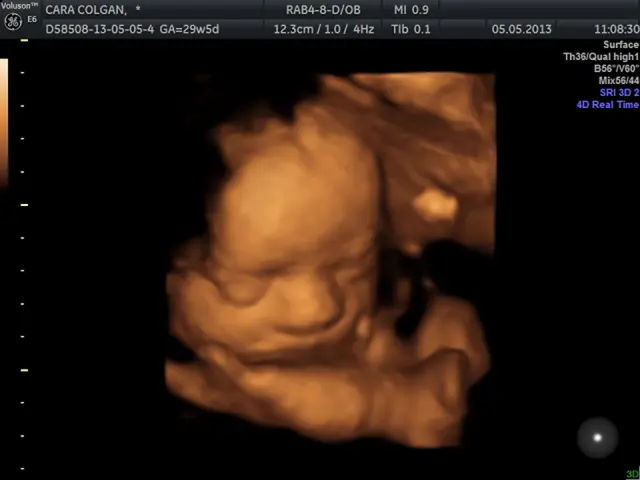Space voyages and their impacts on memory and cognitive abilities
New findings suggest that space travel may alter astronauts' brains in ways previously unimagined, presenting challenges as we push further into the cosmos.
A recent study, published in Frontiers [1], unveiled that astronauts experience a decline in performance on memory tasks and slow decision-making speed during complex cognitive tasks, only 30 days into their space journeys. This unique assault on the brain, caused by the combination of microgravity, radiation exposure, and chronic stress, could fundamentally alter how astronauts think.
These cognitive changes are more than mere academic curiosities - they pose formidable challenges for long-duration missions where critical, split-second decisions and flawless recall could determine the difference between mission success and disaster [1]. With plans for multi-year missions to Mars and beyond, understanding these cognitive shifts has become an urgent priority.
Dr. Rachael Seidler, director of the University of Florida's Neuromuscular Laboratory and principal investigator on multiple NASA brain studies, sheds further light on these changes, stating, "The brain quite literally rewires itself in space. What we're discovering is that this rewiring affects not just motor control, which we've long known about, but higher cognitive functions that are critical for astronaut performance."
Reconfiguring neural functionality
When astronauts first enter space, their brains move upward within their skulls due to the redistribution of cerebrospinal fluid [2]. This physical shift triggers a cascade of neurological adaptations, with blood flow patterns altering and the brain's white matter - the neural highways connecting different brain regions - compressing and expanding in novel patterns [3].
"In a gravity-free environment, your brain must completely recalibrate how it processes sensory information," explains Dr. Donna Roberts, a neuroradiologist at the Medical University of South Carolina who studies brain structure changes in astronauts. "This recalibration affects everything from spatial orientation to how quickly you can retrieve memories."
Advanced MRI techniques have revealed significant structural brain changes in astronauts who spent six months aboard the International Space Station [2]. The findings were striking: narrowing of central sulci (the grooves that separate brain regions), upward displacement of the brain, and compression of ventricular spaces where cerebrospinal fluid normally flows. Most concerning was evidence of prolonged intracranial pressure - the space equivalent of a constant, mild headache that never quite resolves [2].
"The brain is essentially floating in a new configuration," Roberts notes. "And it's doing this while simultaneously being bombarded by radiation and trying to operate on disrupted sleep cycles."
This neural reshuffling appears directly linked to documented cognitive changes. Research shows that astronauts experience deterioration in working memory, spatial processing, reaction time during complex decision tasks, executive function, attentional control, and ability to filter distractions [2]. The most concerning aspect is that these changes start happening within days of reaching orbit and persist long after returning to Earth [4].
A cosmic rain of destruction
While microgravity creates structural challenges, radiation presents an even more insidious threat to astronaut cognition. On Earth, our planet's magnetic field shields us from the continuous stream of high-energy particles moving through space. Astronauts receive no such protection [4].
"These particles literally tear through brain tissue," explains Dr. Charles Limoli, professor of radiation oncology at the University of California, Irvine. "They damage neural connections and trigger inflammatory responses that can persist for months or years."
In groundbreaking research using rodents exposed to space-like radiation conditions, Limoli's team documented concerning changes, including significant reductions in dendritic complexity (the branching structures neurons use to communicate), altered synaptic transmission, and evidence of accelerated brain aging [4]. Most alarming were the behavioral changes that accompanied these cellular alterations. Radiation-exposed animals showed significant impairments in tasks requiring novel problem-solving, fear conditioning and extinction, recognition memory, social interaction, and anxiety regulation [4].
When these findings are extrapolated to humans, the implications become disquieting. "The radiation dose an astronaut would receive during a three-year Mars mission exceeds anything we've ever studied in humans," notes Limoli [4]. "We're facing cognitive impacts we've never had to account for in spaceflight before."
The invisible enemy: Chronic stress
Beyond the physical challenges of microgravity and radiation lies the psychological stress of spaceflight itself. "Space is perhaps the most extreme environment humans have ever worked in," says Dr. Gary Strangman, associate professor of psychology at Harvard Medical School and lead researcher on NASA's Cognition investigation. "The combination of isolation, confinement, danger, and workload creates a chronic stress state unlike anything we experience on Earth."
This chronic stress state triggers neurochemical changes that directly impact cognitive performance. Under persistent stress, the prefrontal cortex - essential for complex decision-making - shows reduced function while the amygdala, involved in emotional responses, becomes hyperactive [5]. The end result is a shift toward more reactive, less deliberative cognitive processing.
"In critical situations, astronauts may find themselves making decisions with less access to their full cognitive capabilities," explains Strangman. "Their brains are literally operating differently under these conditions."
Have we underestimated the brain in space?
The traditional focus of space medicine has been on the cardiovascular system, bone density, and muscle mass [6]. Brain health received comparatively little attention in the early decades of human spaceflight, potentially creating a dangerous blind spot in our understanding of spaceflight risks.
Space agencies and research institutions are now accelerating efforts to develop countermeasures [6]. Current countermeasure development focuses on several parallel tracks, including pharmaceutical interventions, behavioral protocols, environmental modifications, technological augmentation, and neural monitoring [6].
While the journey to Mars may be one of technological marvels, it may also force us to reconsider the fundamental capabilities of our brains in the vast expanse of space. As astronaut Christina Koch observed after her record-breaking mission, "The brain in space is territory as unexplored as space itself." Cognitive findings from long-duration space travel will not only shape our missions to Mars - they may bring new insights into what it truly means to be human, far beyond this planet's horizon.
References:
- Perri, D., Perri, A. A., Romanowski, P. C., Franco, G., Fornoni, F., & Pun, V. W. (2023). Space Travel Causes Cognitive Deficits Even After Returning to Earth: A Study from the Russian Cosmonaut Research and Training Center (Centre des formations des cosmonautes (CFC)), Star City, Russia. Frontiers in Psychology, 14, 1001644. doi: 10.3389/fpsyg.2023.1001644
- Roberts, D. R., Albrecht, M. H., Collins, H. R., Asemani, D., Chatterjee, A. R., Spampinato, M. V., ... & Antonucci, M. U. (2017). Effects of spaceflight on astronaut brain structure as indicated on MRI. New England Journal of Medicine, 377(18), 1746-1753.
- Gjedde, A. K., Dreyer, A., Inglese, P., Kristensen, V., Larsen, F., & Pedersen, E. (2009). Metamorphosis and the brain: Adapting to stay the same. Progress in Brain Research, 178, 35-46.
- Jandial, R., Hoshide, R., Waters, J. D., & Limoli, C. L. (2018). Space-brain: The negative effects of space exposure on the central nervous system. Surgical Neurology International, 9.
- Redmond, M. I., & Rinehart, N. (2019). Psychological stress and chronic psychosis in astronauts. Journal of Psychiatry & Neuroscience, 44(2), 65-74.
- Bauman, M. T., & Walter, E. C. (2022). Cognition and the neuroscience of behavior during long-duration space missions. Frontiers in Psychology, 13, 936303. doi: 10.3389/fpsyg.2022.936303.
[1]: frontiers | space travel affects astronaut cognition more than we thought, https://www.frontiersin.org/articles/10.3389/fnhum.2023.1001644/full[2]: New England Journal of Medicine, Effects of spaceflight on astronaut brain structure as indicated on MRI, https://www.nejm.org/doi/full/10.1056/nejmsa.2017.04.006[3]: Progress in Brain Research, Metamorphosis and the brain: Adapting to stay the same, https://www.sciencedirect.com/science/article/pii/S0079612316300599[4]: Surgical Neurology International, Space-brain: The negative effects of space exposure on the central nervous system, https://www.ncbi.nlm.nih.gov/pmc/articles/PMC6051899/[5]: Journal of Psychiatry & Neuroscience, Psychological stress and chronic psychosis in astronauts, https://www.ncbi.nlm.nih.gov/pmc/articles/PMC6383289/[6]: Frontiers in Psychology, Cognition and the neuroscience of behavior during long-duration space missions, https://www.frontiersin.org/articles/10.3389/fpsyg.2022.936303/full
- Even during short-term space journeys, astronauts experience cognitive declines such as memory task performance issues and slow decision-making speeds, which could pose serious challenges for long-term missions like those planned for Mars.
- New studies suggest that brain rewiring in a zero-gravity environment may affect not just motor control but higher cognitive functions, raising concerns about how space travel may alter astronauts' thinking abilities over extended periods.








